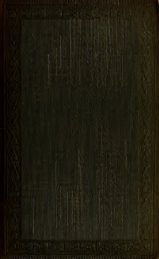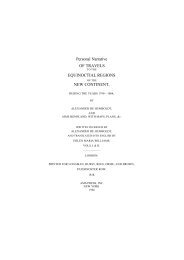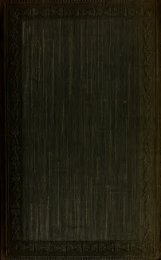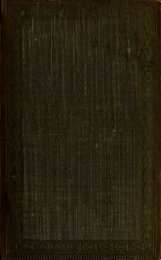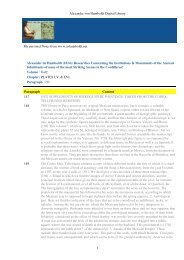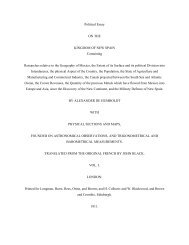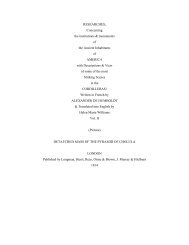See the complete document here
See the complete document here
See the complete document here
You also want an ePaper? Increase the reach of your titles
YUMPU automatically turns print PDFs into web optimized ePapers that Google loves.
180<br />
COSMOS.<br />
abroad b^ <strong>the</strong> conquests of Alexander, scientific observatioii<br />
and <strong>the</strong> systematic arrangement of <strong>the</strong> knowledge already ac-<br />
quired were elucidated by <strong>the</strong> doctrines and expositions of<br />
Aristotle.* We <strong>here</strong> indicate a happy coincidence of favoring<br />
relations, for, at <strong>the</strong> very period when a vast amount of new<br />
materials was revealed to <strong>the</strong> human mind, <strong>the</strong>ir intellectual<br />
conception was at once facilitated and multiplied through <strong>the</strong><br />
direction given by <strong>the</strong> Stagirite to <strong>the</strong> empirical investigation<br />
f facts in <strong>the</strong> domain of nature, to <strong>the</strong> profound consideration<br />
of speculative hypo<strong>the</strong>sis, and to <strong>the</strong> development of a lan-<br />
f!:uao:e of science based on strict definition. Thus Aristotle<br />
must still remain, for thousands of years to come, as Dante<br />
has gracefully termed him,<br />
" II maestro di color die sanno.^^\<br />
The belief in <strong>the</strong> direct enrichment of Aristotle's zoological<br />
knowledge by m.eans of <strong>the</strong> Macedonian campaigns has, however,<br />
ei<strong>the</strong>r wholly disappeared, or, at any rate, been rendered<br />
extremely uncertain by recent and more carefully-conducted<br />
researches. The wretched compilation of a life of <strong>the</strong> Stagirite,<br />
which was long ascribed to Ammonius, <strong>the</strong> son of Hermias,<br />
had contributed to <strong>the</strong> diffusion of many erroneous<br />
views, and, among o<strong>the</strong>rs, to <strong>the</strong> belief that| <strong>the</strong> philosopher<br />
accompanied his pupil as far, at least, as <strong>the</strong> shores of <strong>the</strong><br />
Nile.^ The great work on Animals appears to have been<br />
written only a short time after <strong>the</strong> Meteorologica, <strong>the</strong> date<br />
of which would seem, from internal evidence.il to fall in <strong>the</strong><br />
* Compare, on this epoch, Wilhehii von Humboldt's work, Ueher<br />
die Kawi'Sprache nnd die Verschiedenheit des menschlichen Sprachbaj.'6s,<br />
bd. i., s. ccl. und ccliv. ; Droysen, Gesch. Alexanders des Gr., s. 547 ; and<br />
s. 24. t Dante, Inf., iv., 130.<br />
Hellenist. Staatensystem,<br />
X Compare Cavier's assertions in <strong>the</strong> Biographic Universelle, t. ii .<br />
1811, p. 458 (and unfortunately again repeated in <strong>the</strong> edition of" 1843,<br />
t. ii., p. 219), with Stahr's Aristotelia, th. i., s. 15 und 108.<br />
§ Cuvier, when he was engaged on <strong>the</strong> Life of Aristotle, inclined to<br />
<strong>the</strong> behef of <strong>the</strong> philosopher having accompanied Alexander to Egypt,<br />
**<br />
whence," he "<br />
says, <strong>the</strong> Stagirite must have brought back to A<strong>the</strong>na<br />
(Olymp. 112, 2) all <strong>the</strong> materials for <strong>the</strong> Historia Animalinm." Subsequently<br />
(1830) <strong>the</strong> distinguished French naturalist abandoned this opin<br />
ion, because, after a more careful examination, he remarked " that <strong>the</strong><br />
descriptions of Egyptian animals were not sketched from life, but from<br />
notices by Herodotus." (<strong>See</strong>, also, Cuvier, Histoire des Sciences Nat'<br />
urellea, publiee par Magdeleine de Saint Agy, t. i., 1841, p. 136.)<br />
II<br />
To <strong>the</strong>se internal indications belong <strong>the</strong> statement of <strong>the</strong> perfect<br />
insulation of <strong>the</strong> Caspian Sea; <strong>the</strong> notice of <strong>the</strong> great comet, which appeared<br />
under Nicomachus when holding <strong>the</strong> office of archon, Olymp.<br />
109, 4 (according to Corsini), and which is not to be confounded with<br />
that which Von Bocuslawski has lately named <strong>the</strong> crmet of Aristotk



